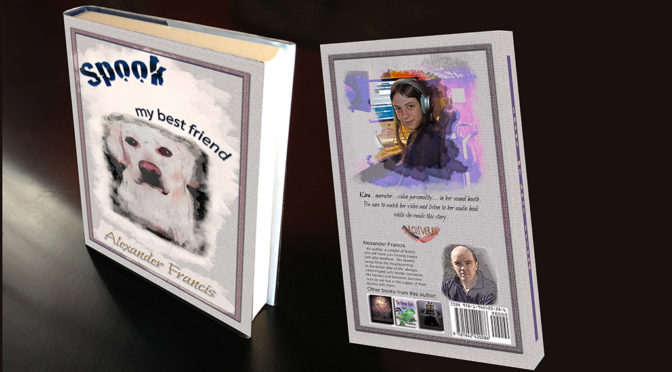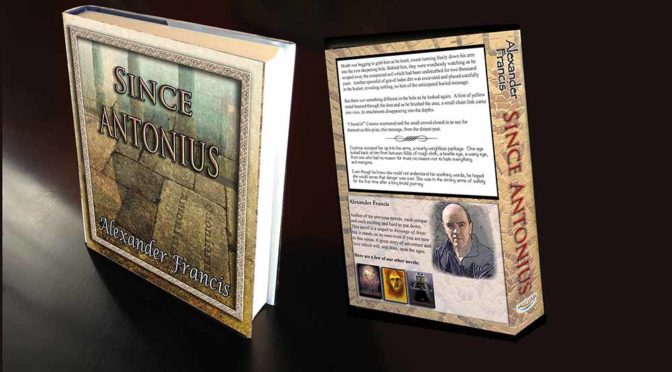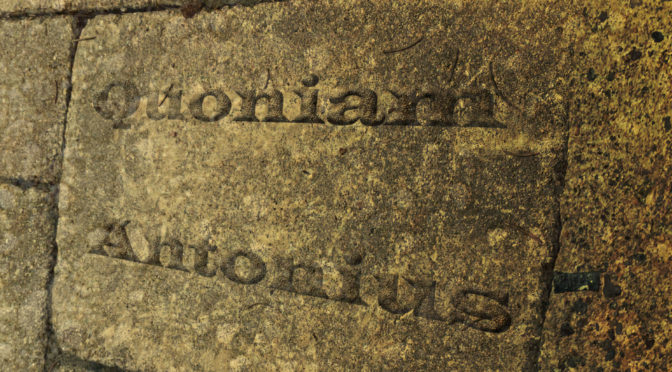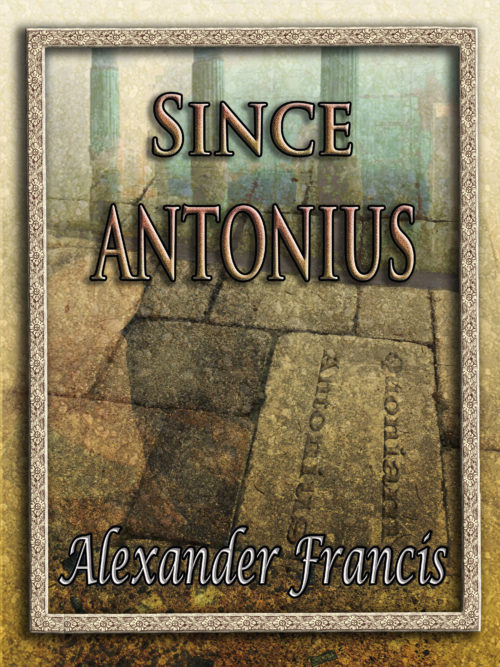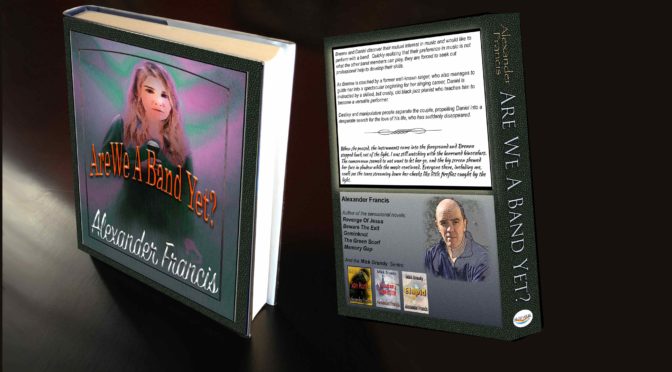Comey’s Eyes
A Short Story
by
Alexander Francis
New York, 1891 8:00 AM
A little shift backwards and to the left enabled more of his chest to be exposed to the morning sun, just arising across the street above Murphy’s. Effects of the radiant heat on his blue coat were nearly instantaneous and welcome, creating a warm sensation spreading from his abdomen. He leaned forward slightly, taking pressure from his hands, which had been resting against the rough cold brick behind him. He was in a slight depression in the line of irregular, though continuous, structures forming the south wall of Walker Street. From this position, he could see nearly the entire sweep of the north side and yet be partially hidden from casual view. The presence of police endlessly walking their beat was certainly a deterrence to crime, but regularity provided incentives to the so inclined to conduct their trade just out of view, skillfully timing the crime to the pace taken by the patrolling officer.
Comey had chosen this spot, this moment, with precision, knowing that his absence from the street would embolden thugs and other cockroaches, incentivizing them to roll someone right in his view. Comey’s beat was from Broadway to Broadway, all two blocks of it. On paper, it didn’t sound like much, but this was a street on the front lines between the large numbers of Irish poor and the expanding tribes of Italians just encroaching from the dock area on the east. Violence and theft were a normal way of life here, and the only thing preventing chaos and utter mayhem was a solitary policeman dressed in his tight-fitting suit of blue, brass buttons lined up vertically on his chest. Weapons were not routinely issued, no matter the need, but resourceful men like Comey obtained a firearm at their own expense or by fortune at the scene of a crime. Comey’s was resting against his left hip, bulging under his thick wool jacket, giving some sensation of of security, however false it actually was. His first line of defense, or offense, was the stout, black, ash stick dangling from his belt which he unhesitatingly, and frequently, used with vigor when needed.
Comey stood immobile, a statue enveloped in blue wool, taking in the activity of the street, but not visible by motion or attention. He was part of the scenery, no more or less. Up at the end of the other block was the house he was born in, twenty-seven years previous, and this block had been his in childhood, actually theirs, the group of dirty boys who ranged from one end to the other, playing games but also engaged in various nefarious activities of petty theft or assault on one of the Irish boys caught in the open without support. A wild, carefree childhood, which mostly taught that you would only survive by wits and quickness, not on the goodness of others, or even luck.
Directly across the street, moving along the yet unlit buildings in a furtive, hunched over demeanor was an old acquaintance from childhood and not a sight which recalled fond memories. Flach, little grubby Flach. A sneak, a liar from birth, a pariah, a vulture, but most unquestionably, a rat. Comey had learned long ago to never turn his back on Flach. He watched with interest, following Flach with narrowed eyes, nearly hoping that Flach would give him reason to use his bat. With a couple of rodent-like gestures, guiltily looking backward as if he were pursued by a muscular short-haired dog, he disappeared, oozing into a narrow alley. Comey knew very well that alley, appropriately named ‘mud cave’ by the boys of childhood. It lead to a brown wood hovel at its termination, infested by Flach and his kin. Comey had glimpsed it once or twice and would shutter to enter it, even if forced by duty.
Tapping toward him along the sidewalk, Noninna Pugliesi struggled her way toward his position. Comey shifted uncomfortably, wishing for a cloak of invisibility. Noninna was the ever-present godmother of the Italian sector, mother or grandmother to numberless Italian immigrants and the self-appointed conscience of the rest. In his youth, Comey had, many times, been singled out by Noninna for verbal thrashing in their native Italian. He mostly deserved it and more. Nevertheless he was always left feeling that he never measured up to her expectations and never would. Her presence was a reminder of his many failings in life, some he could have changed, others were more of fate than choice.
Noninna carried her head low, facing the sidewalk, not the direction of her slow progress. It was the hand of age on her, forcing her body to fold forward, her weight supported by her slender cane, contrary to natural balance. She was dressed as she always had been, a black dress of no ornamentation, and covered across the shoulders by a woven white shawl, long enough to nearly touch the concrete walk. Her head was partially concealed by loose black lace, the ends dangling freely near her painted rosy cheeks. The image of her as a young vibrant woman could not be summoned, even though it had to have occurred at some point. Comey held her in his peripheral vision, hoping she wouldn’t notice him, not be aware that he was present. It wasn’t as if his current position was one of shame but that he had always disappointed Noninna and forever would feel the weight of her utter contempt.
The last day in this neighborhood before he left for a four-year hitch in the Army, he ran into Noninna, not far from this very spot. “And what are you so happy about, Comeo Geniachotchi?” she had demanded, capturing him in her baleful stare. He remembered stammering, lost for words for the moment, then recovered enough to answer.
“I joined up, and I leave tomorrow,” he had responded. Noninna nodded while looking him up and down slowly as if to determine if the Army had made a poor selection and should think it over.
“Try not to get yourself killed,” she had said before turning her back and walking away. Since he returned, he had seen her in the distance a couple of times but had not been brave enough to speak with her.
The tapping stopped right in front of him, and he could see her right eye looking at him, her face turned toward him as far as it probably could. Her head went subtly up and down a couple of times before she spoke. “Glad to see you came back, Comeo. Always knew you would turn out good.” With that, the tapping started again, and she slowly moved away, a small awkward black mass but the conscience of the community, and one that had little time left in this life. Comey felt his eyes moisten as she receded into the distance and inevitably into history.
It was a jolt seeing Noninna again, and it brought back a flood of memories. There was no spot anywhere in sight that something memorable had not occurred. Just across the street in the doorway of Murphy’s Butchery was where he had taken his first stolen kiss. Her name was Gabriel, like the angel, and she was standing in the alcove of the doorway just out of reach of the rain which was pelting the hot summer street, creating steam as well as splash and noise. He ducked in beside her, and before she could object or ward him off, he seized the unguarded moment and planted a big kiss on her cheek. He pulled away expecting a slap as a reward but instead found her face pleasant and upturned toward him.
“Why Comey,” she said, using the Americanized version of his first name. “I didn’t think you even knew I am alive.” Her delicate hand went absently to her face in the area of his kiss. Gabriel wasn’t beautiful, but had that rare intensity about her that some women are blessed with, making up for any minor imperfections in features or shape.
“Of course I can see a pretty girl…even from a mile away. You especially.” His remark sent a shower of color to her cheeks. He surmised that few had called her pretty, especially to her face. She reached out and grasped his hand by the fingers, turning toward him and moving slightly closer.
“If you are really interested, you could drop by my house someday.”
“And get beaten to death by your brothers? You know I can’t do that.”
She let his fingers go and moved back a pace, fingering her hair as she thought. The rain was continuing and thunder muttered in the distance, an indication that more was coming. Her clear eyes flashed at him then back to the street, deciding which direction she should go.
“It’s not my fault, Gabriel, you know that.” he said, trying to prevent her from leaving without additional conversation.
“If you were brave enough to chance it, then I might have been…..”, she paused, and with a last look into his eyes, bolted into sheets of rain, one hand over her head in a futile attempt to ward off the pounding water, disappearing down the street, leaving Comey struggling with his emotions and his regrets and his hesitations.
Comey had never again spoken to Gabriel, though she continued to live on this very street. She had married, as expected, to another Irishman, and produced four children, likely more some day. They passed occasionally and each time met eyes. She still had the same inner fire, still had that Irish pride that she would carry until the day she died. It always gave him unexpected agony to see her and realize that, with some effort, he could have had a wife who would have given him everything a man could have ever wanted. Instead, he shared an apartment with another policeman, whom he rarely saw. The loneliness, up six flights of wooden stairs and two rooms. As much as he would ever own or have in this life.
A rhythmic clattering of iron shoes against brick announced the arrival of horse-drawn carts full of fresh produce straight from farms just outside the city. One slowed and pulled to the curb just east of Comey’s position as two muscular men sprang free and hit the street in a crouch, proceeding to noisily pull out wooden display stands. It was the rhythm of New York, the heartbeat of the city, the familiar and ordinary but that which more than anything signaled that life was eternal, and New York was its home.
Women appeared with shopping baskets draped over one arm, leaning and talking with one another as they walked toward food lined up with remarkable order in so short a time. The noise level was increasing by the minute, consisting of a blending of independent wills, needs and souls as they gathered their staples, sold them, sang out prices, haggled, walked, and sharing their lives with horses who shifted from leg to leg and watched and listened, their ears flicking from side to side.
Comey had missed this beginning of morning in his days roaming the dry and empty West. To an outsider, the street and sidewalk was the essence of chaos, but to a New Yorker, especially one born to this very block, it was the expected start of an ordinary day. A fragmentary glimpse of a young woman in a scarf made Comey reflexly look again, studying the crowd with intensity, his mind recalling similarity with a young woman who had once held his fascination.
She was named Mary Beth O’Rielly and was as radiantly beautiful as any young man could ever imagine. When her green eyes fell on him, it was like a punch or bolt. She knew her power and followed her visual caress with a bright smile and a soft welcoming voice. Their first verbal contact was at a food cart, similar, or perhaps exactly the same ones, as those being rapidly installed on the sidewalk. She had reached for a melon, and his hand fell on hers quite by accident or perhaps provenance.
“Hi,” she said, and laughed. “That’s mine, sir, kindly take your hand away,” she spoke in jest then picked it up and tossed it to Comey. “On second thought, I don’t want it.” she giggled. That’s all it took, a brief moment close to heaven, and he was caught in her web.
“People call me Comey,” he offered. “What shall I call you”?” He extended his hand open for a shake or even simple contact.
“Oh, I’m sure you know, and if you don’t, you can ask around.” With a toss of her golden hair and a sideways smile, she left him standing, watching her leave, still holding the melon.
“Buying the melon?” an accented voice inquired. Comey looked down and saw an older Italian vendor, his hands on his hips in a somewhat confrontational posture. The man was old enough to be Comey’s father, thick and mustached, with hairy arms.
“Know that girl?” Comey inquired, tossing the melon up and catching it in a manner designed to irritate.
“Surely. Everybody know her. Some dish, yes? Problem for you that she belong already. You don’t go there, capire?
“Who? Got a name?” The man had stood silent, watching the melon go up and down. Comey dug into his pants and produced a quarter, much more than the worth of the melon. He flipped it toward the vender, and it was caught in the air. The man hesitated for a moment as if deciding.
“The big man. His. You leave this one alone.” He pocketed the quarter and turned his back.
There was only one person fitting that description, and Comey knew him by sight and by name. Feido Feddichoria, the slick dressing, smooth talking killer most called “Mad Freddie,” at least behind his back. Feido had also grown up in this neighborhood and even in childhood was one to avoid. At this time, Feido kept company with two others just like him. They traveled as a group, always in dark suits, always outwardly pleasant, at least in a superficial way. It was the dark darting eyes and the fake smile which projected their actual propensity. Feido was favored by street juveniles, their kind in abundance, who frequently loitered around ready to pilfer or grab and run. Each time Feido appeared, they gathered, expecting and receiving whatever was in his pockets, at times candy, other times coins. Feido owned them, and it paid off because they were his eyes and ears keeping Feido informed about everything and everybody of interest on the street.
And it was Feido who claimed to possess the beautiful Mary Beth, keeping all suitors in fear of reprisal or even meeting silent death in an alley some starless night. Mary Beth obviously did not agree to the arrangement and had her own opinion about whom she belonged to. But Mary Beth, by nature’s design, was drawn to flirt with danger and with tough, hard men, whom she collected as if captured prizes at a fair. It thrilled her to have these big men stammer and speak softly to her, as if they were the one to have a chance at capturing this glamorous butterfly. Mary Beth would laugh, bat her eyes, and move away before they could gather courage to press their issue. But when she did the same to Feido, he was not flustered by her beauty, instead moving quickly to claim his prize. Mary Beth had made a grave and irreversible error in judgement.
Comey, in his youthful vigor, had decided that he was the one to break Feido’s hold over the lovely Mary Beth. He had decided that very morning, with the odor of melon fresh on his hand and the memory of Mary Beth still in his heart, that he would pursue her and take on these street thugs his own way.
He knocked on her door one evening, his face fresh from a hot shave, a slender package of chocolate held behind his back. When she arrived home, he had been waiting in shadows, anticipating her arrival, while practicing his lines. When the door opened and she stood before him, backlit, her blond hair aflame with gaslight from within, her marvelous face cloaked in shadow, Comey realized that he had forgotten every word stored for this occasion.
“Hello, Mary Beth,” he stammered, then hesitated, recovering slightly. “I came by to give you this.” And he awkwardly produced the foil-wrapped package and extended it toward her. She took it and stood in silence, regarding and accessing this young puppet as to his merits.
“You called yourself Comey,” she stated. “Not Comeo, as your friends call you.” It was a statement designed to show in what regard she and others of her Irish race held the newcomer Italians trying to adapt to the strange ways of New York. But it also revealed that she had taken the time to learn more about him.
“I would be honored if you would call me by either name.”
“Exactly what do you want, Comeo Geniachotchi?” she asked softly, still regarding him at a distance, but her change in tone indicating an opening.
“It will take a lifetime to answer that question, but for now, just a bit of conversation will do.” He smiled, hoping his glib answer would thaw her resistance to yet another amorous Italian suitor.
“Come in, Comey,” she murmured and backed away from the opening.
An older woman slowly rose from her chair, and with a sideways, disapproving glance at the Italian alien standing unfortunately in her domain, she retired to an adjacent room, making a point to leave the door open as propriety demanded.
Once in, Comey glanced at the apartment and its humble furnishings. The contrast between the obvious poverty of its occupants and the utterly breathtaking woman standing beside him was hard to merge or rationalize how both could exist together in the same universe.
“Sit there, please,” she requested, indicating an old brown rocker near the center of the room. Comey did as she asked and watched her be seated on a small stool, much lower in height. The grace of her movements, her willowy suppleness and her penetrating yet unforgettable eyes made him forget their surroundings.
An uncomfortable period lapsed with no speech between them. Being able to look at her for so long at one time made Comey forget the world and its ticking clock, inexorably counting away the moments their lives, one second for each, until they were all gone.
“I would give anything to know you better,” Comey blurted, unmasking the truth in his heart.
“You are most interesting, and I am willing…but…” she let her voice trail off, unwilling to say what they both knew. She was owned, not by choice, but by brute force.
“But another claims you,” Comey suggested. She didn’t nod or answer, letting silence speak for her.
“Perhaps I could convince Feido that you are not taken, that you have a free will.”
“You will be killed. I don’t want that.”
“All I want is for you to say that you will give me a chance to properly court you.”
“And all I can answer is that I would if it were possible.”
Comey fought to bring his focus back to reality and to clear his head of emotion, just now hovering at the brim. The sun had made it fully past the tops of the buildings across the street, and its warm rays caused him to inhale a deep breath and relax. All the players in this memory, except him, were long gone and buried, but images and voices remained fresh and potent, once again stirring his soul with both hatred and passion. There are turning points in life, and he had already experienced plenty of them, enough to understand that life’s path can hinge on one moment, even one word at times. And so can a man’s very life.
Across the street on the sidewalk marched a familiar group of workmen, dressed in rough clothes and brimmed caps. They carried the tools of their trade on their back and in wooden boxes and in smears of plaster left on their garments. On their way to work after having a substantial breakfast supplied dutifully by their loving wives. Something Comey had never experienced and the loss of it tore at him. His father had died young, falling from a building under construction near the park. They had received a letter of sympathy and a payment of fifty dollars to cover their loss, but the death of the principal breadwinner meant that Comey and his mother were now and forever paupers. Comey had done what he could, but a ten year old isn’t capable of earning very much, even after giving up his education and his youth in the effort. Margo had been popular and had many friends who contributed what they could, but slowly they descended into that deplorable state of occasional begging. Comey was tortured by it, not for himself, but to see his mother stoop so low as to ask strangers for help. She had lasted for eight more years before succumbing to gathering poor health and its inevitable conclusion.
Whatever Comey was or wasn’t, one thing was certain. He was tough because he had to be. At first, he became a dock worker, but only when there were ships to unload and when others didn’t show up to work. It was enough to get by while he searched for that singular pivotal moment in life which would show him the way forward. Any of the trades required years of apprenticeship. The police preferred some military experience, and the clerkships paid poorly. There was also the lure of the gangs, who paid the best and required only guts and muscle. But Comey was taught by his mother to avoid that type and to obey the law and so he did.
Word got back to Feido regarding Comey’s visits with Mary Beth. In this small tight community, no action went unnoticed. Comey knew it was coming…the inevitable confrontation. And he wondered if it would emerge in the open or in the dead of night. He had guessed night, and he was shortly proven correct.
One day the docks provided plenty of work; in fact Comey’s shift labored late into the evening and then into night. Comey at last signed out and started walking toward Walker street, down dark streets which were now nearly empty of pedestrians. A sixth sense came about him that this was the night things would come to a head. His only defensive weapon was a moderate-sized hawkbill knife used to cut rope and bindings, but it was exceedingly sharp from constant whetting. Without thinking, his hand went into his pocket and pulled the knife out and opened the hooked blade. At necessary times, he would move to the center of the street to avoid dark alleys, the favored site of so many of New York’s muggings and stabbings.
He had visited Mary Beth exactly seven times, and the visits were becoming longer and longer. She repeatedly refused his offer to go out, and he didn’t need to ask her why. Feido had trapped them both in some way, both condemned to hide their developing relationship from the public eye and from Feido’s spies. Each visit was better than the last, and they were getting to know each other in this way, perhaps beyond any other method. She had loosened up with him, as he had done toward her, and their mutual attraction was nearly at the point of some physical contact, at least a respectful, brief embrace.
Comey heard footsteps behind him just where he expected, a particularly dark street of warehouses with no other people in sight. He stopped and turned. Three men were silhouetted in minimal light coming from a great distance, and they were coming toward him with purpose. He could almost see the objects they carried for weapons hanging from lowered arms. As they grew closer, they spread out like pack dogs do to surround their prey and to enable attacks from different directions making defense difficult. But Comey had seen this simple strategy many times on the street as gangs of young toughs fought pitched battles for control of home turf. There was only one desperate way to counter a group, and bears and other creatures had figured it out long before street thugs. Each oncoming aggressor has to be taken out one at a time. An aggressive attack on one, if successful, causes the others to pause, even if briefly, and then the next will fall to the same technique.
Just as the first weapon was lifted to strike, Comey lunged toward one on his right, his knife slicing an arc terminating at the mans’s exposed neck. He felt the contact occur, and before the assailant grabbed his wounded throat on his way to the street, the center one came under assault. This time the knife was swung up, the hook point leading the way as the knife entered a soft abdomen and continued upward in a sweeping thrust. Something hit Comey in the neck and caused him to stagger, then buckle to his knees. Just before a second strike could be made, Comey grabbed a leading leg and pulled with everything he had. Once the man had landed on his back, the hawkbill knife plunged deeply into his leg just under his crotch and was violently pulled toward his knee accompanied by an agonizing scream.
Comey stood calmly and viewed his three adversaries from above. Two were writhing amid loud moans and calls for help. The one with a neck wound wasn’t moving. He knew that he should finish the wounded before they could point the finger of the law at him. That was the correct and wise thing to do but not the right thing. Comey paused to wipe the knife blade on the clothing of one of the fallen and then calmly put it away and continued his way home. The facts are what they are, and he would deal with the result later.
And there was a result, a very bad one, and one that still haunted his dreams. The very same morning, Mary Beth was taken from her mother’s arms and disappeared from the public’s watchful eye. No amount of persuasion from Comey, no threat, no level of violence could uncover her location or determine her well-being. Mary Beth had ceased to exist that very day. The culprit was obvious and should Comey have encountered Feido, his moments on earth would have ended with blinding fury. But Feido had moved on, as had his band of thugs, yet Comey still searched in vain for months before giving up. The tough Irish cops were of no help and had no interest in looking for an Irish lass who had taken up with Italians. As far as they were concerned, she had deserved her fate, whatever that was.
Two of the thugs encountering Comey in that dark street had died, the other nearly succumbed, so the word had gotten out that Comey was not a man who should be challenged. He didn’t want that reputation, or that stigma, and it burdened him. Thankfully, his dear mother was no longer there to be humiliated further than life’s pitfalls had already taken her.
At times, Comey regretted his decision to return to Walker Street after his discharge from the Army. After all, he had no living relatives, no prospects to earn a living and most importantly, no woman to connect with. Still, he did return, and here he stood, a blue statue in shadow, trying to maintain what passes for civilization, at least in this block, this block of memories.
During his absence, some things had changed and glimmers of truth slowly emerged. Fiedo had died in a gang war across town, and afterward, news of Mary Beth had reached the surface. She had been taken to the northern border of New York, to the area of slaughterhouses and stockyards, to the most foul-smelling stench of city anywhere in the known world. And there she was installed in a one room apartment across the hall from the headquarters of Feido’s mob. The beautiful Mary Beth was used until she was used up, passed around, eventually being discarded as trash. She died alone, in poverty, infected with Tuberculosis and sexually transmitted diseases yet her only crime in life had been being attractive to the wrong men. When he heard the story, Comey had wept openly, an un-manly thing to do in public in those hard times. It was the reason that Comey had joined the police force, the only thing that separated him from others who had grown up in this very block, who were indifferent to the ugly gutters of life, who accepted things rather than struggled against them.
This was the reason that Comey loitered in shadow this very morning. He wanted the vermin to swarm the street while he watched. The lawful ability to crack their heads with his baton was what he lived for, the only thing he lived for. Each one falling to the street, bleeding and unconscious, was a blow for Mary Beth, a small retribution for the foul short life she endured because of his interest in her and his innocence in thinking he could outwit the mob.
The collective intelligence of the street always knew when Comey was on duty, even though they could not always see him, the street felt his presence, and it was enough to thwart knowledgeable criminals. The unaware, the newcomers, the mindless, felt his wrath and were removed like garbage while lying in the back of a horse-drawn police wagon.
Comey’s eyes followed a small group of women carefully threading their way across Walker street and coming toward him. One of them, a slender young girl with long dark hair, seemed to be looking right at him. Then he remembered seeing her earlier among the carts, her headscarf cloaking her features and hiding her hair. As they grew closer, he studied each face trying to recall the family name and their relationships. The Italians had imported many of their old world customs to New York including an obligation for formality and, at times, excessive politeness. One social mandate had stuck and continued in the new world and that was the introduction of young people to each other by parents. It was a very old custom, likely rooted in the ancient Roman concepts of paterfamilias and the important role of extended family. The young simply could not be permitted to choose a mate on their opinion alone.
The group stopped in front of him, inspecting him thoroughly before speaking. He remembered the family and especially the father, who had been murdered for pocket change in an alley not far from this very spot. Comey himself had apprehended the assailant and had watched his execution by hanging one month later. Afterward, he extended his regards to the victim’s widow, offering any support he could give and this was the very woman now standing before him and smiling.
“We have not forgotten your kindness, Officer Geniachotchi. Do you still recall us and all that you did to help after the loss of my husband?” Maria Petroni asked while nodding affirmative to assist his memory.
Comey smiled back at her and tipped his helmet back a bit while nodding yes. The young woman behind Maria had not taken her eyes from his face, and one glance at her confirmed that the young girl he remembered had become strikingly beautiful as she morphed from a child into a woman. Her ivory face was encapsulated by her dark hair and outlined by the feathery scarf she wore. He simply could not recall her name and perhaps had never heard it previously.
Comey waited on the reason for their accidental reunion, or had it been purposeful? It seemed likely that he was noticed earlier, and this small family had returned just to speak with him. Maria had brought both daughters to meet him, and there must be an important reason for doing so.
“You have no father to speak for you, Comeo, and I have no husband to speak for me,” Signora Maria Petroni stated. “So I have to take this responsibility in asking you to come to our home for a meal. If you will.” Maria’s English was heavily accented but deliberately and slowly spoken even though she was aware that Comey could speak Italian like a native. Her smile faded as she waited for his answer. From behind her, the angelic face of her daughter smiled broadly, exposing her white even teeth and her tinkling eyes. She was the reason for the invitation. Maria’s daughter had come of age and proper introductions were necessary, and Maria had selected Comey as a suitable mate, likely after much thought and inquiry. This was an invitation to marry, though that event was still long into the future.
Comey slowly unbuckled his helmet and took it off, tucking it under his left arm. “My dear, I do remember you, and I have thought of you and your family often. I am flattered by your invitation, humbled in fact. Of course I will come, and also I am grateful to be asked.” He understood that formal introduction to her daughters would come at her home and before sitting for a meal. A street was no place for a young desirable woman to be offered for inspection, even in an informal way. There was a proper way to do things and a time and place for everything.
“Then Sunday at three?” she offered. The dark eyes of her daughter glowed at him, and she lifted her chin as if to say, “I am especially desirable, and you will have to work hard at winning my heart”.
“Sunday it is, and thank you again for remembering me,” Comey accepted, and turned his focus on her daughter who had turned away and had her back to him. It was enough of a view to establish that she was indeed lovely from any angle.
Comey watched them as they slowly disappeared from view, merging with the panoply of humans, each with their own tasks and destinies. He put his helmet on and smiled as he fastened the chin strap. Perhaps life was about to improve after all.
Alexander Francis
Walker Street


